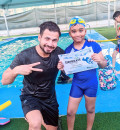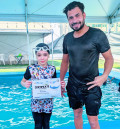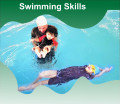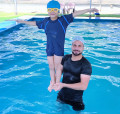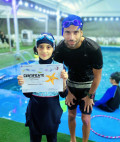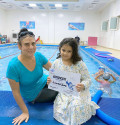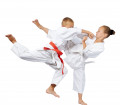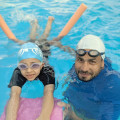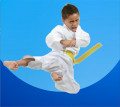
The Skills of a Karate Instructor Comprehensive Guide
2024-04-15 - karateIntroduction
Karate, an ancient martial art form originating from
Okinawa, Japan, has garnered immense popularity worldwide for its disciplined
techniques and philosophies. Behind every successful karate class lies a
proficient instructor who not only imparts knowledge but also embodies the
essence of this martial art. In this article, we delve into the multifaceted
skills required for effective karate instruction.
Defining the Purpose: Educating and Inspiring
A karate instructor serves as a mentor, guiding students
through their martial arts journey while instilling discipline, respect, and
perseverance.
Creating a Safe Environment: Ensuring Student Well-being
Prioritizing safety is paramount, as the instructor must
create a conducive atmosphere where students can learn and practice without
fear of injury.
Proficiency in Kata
Kata, a series of predefined movements, serves as the
foundation of karate. An adept instructor possesses a deep understanding of
various kata forms and can effectively demonstrate and teach them to students.
Technical Precision in Kumite
Kumite, or sparring, requires precise execution of
techniques while maintaining control and respect for the opponent. A skilled
instructor adeptly guides students through kumite, emphasizing both offensive and
defensive maneuvers.
Expertise in Basics
Fundamental techniques such as punches, kicks, and blocks
lay the groundwork for karate proficiency. An instructor meticulously refines
these basics, ensuring students develop a strong foundation essential for
advancement.
Effective Communication Skills
Clear Instruction Delivery
Articulating techniques and concepts clearly is imperative
for effective learning. A proficient instructor communicates with clarity,
utilizing simple language and concise explanations.
Motivational Encouragement
Inspiring and motivating students is a hallmark of a skilled
instructor. Through words of encouragement and constructive feedback, they
nurture confidence and determination in their students.
Adaptability and Flexibility
Tailoring Instruction to Individual Needs
Every student possesses unique abilities and learning
styles. A competent instructor adapts their teaching methods to cater to
diverse needs, ensuring every student receives personalized guidance.
Handling Diverse Skill Levels
In a karate class, students may vary in skill level and
experience. A skilled instructor adeptly manages this diversity, providing
challenges for advanced students while supporting beginners in their journey.
Leadership and Mentorship
Leading by Example
A karate instructor serves as a role model, embodying the
virtues of discipline, humility, and integrity. Through their actions, they
inspire students to emulate these values both on and off the mat.
Fostering Growth Mindset
Encouraging a growth mindset is essential for fostering
continuous improvement among students. An effective instructor celebrates
progress and views setbacks as opportunities for learning and growth.
Conclusion
In conclusion, the role of a karate instructor extends far
beyond teaching techniques; it encompasses mentorship, leadership, and
effective communication. Through mastery of karate techniques, effective
communication skills, adaptability, and leadership qualities, a proficient
instructor not only cultivates martial arts expertise but also shapes the
character and values of their students.







.jpg)




















































